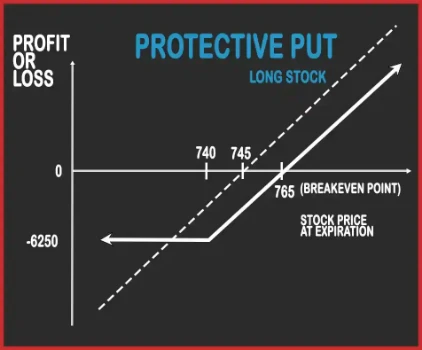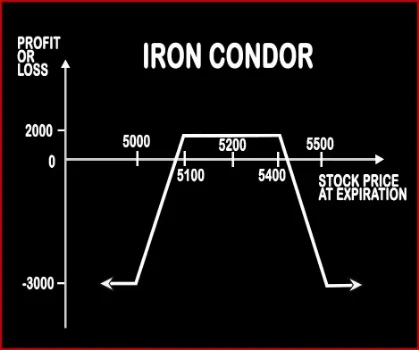Compare Strategies
| PROTECTIVE PUT | IRON CONDORS | |
|---|---|---|

|

|
|
| About Strategy |
Protective Put Option StrategyProtective Put Strategy is a hedging strategy where trader guards himself from the downside risk. This strategy is adopted when a trader is long on the underlying asset but skeptical of the downside. He will buy one ATM Put Option to hedge his position. Now, if the underlying asset moves either up or down, the trader is in a safe position.
|
Iron Condors Option StrategyIron Condor is a neutral trading strategy. A trader tries to make profit from low volatility in the price of the underlying asset. This strategy will be better understood if you recall ‘Bull Put Spread’ & ‘Bear Call Spread’. A trader will buy one Deep OTM Put Option and sell one OTM Put Option,. He will also sell one OTM Call Option and buy one Deep OTM Call Option. .. |
PROTECTIVE PUT Vs IRON CONDORS - Details
| PROTECTIVE PUT | IRON CONDORS | |
|---|---|---|
| Market View | Bullish | Neutral |
| Type (CE/PE) | PE (Put Option) | CE (Call Option) + PE (Put Option) |
| Number Of Positions | 1 | 4 |
| Strategy Level | Beginners | Advance |
| Reward Profile | Unlimited | Limited |
| Risk Profile | Limited | Limited |
| Breakeven Point | Purchase Price of Underlying + Premium Paid | Upper Breakeven Point = Strike Price of Short Call + Net Premium Received, Lower Breakeven Point = Strike Price of Short Put - Net Premium Received |
PROTECTIVE PUT Vs IRON CONDORS - When & How to use ?
| PROTECTIVE PUT | IRON CONDORS | |
|---|---|---|
| Market View | Bullish | Neutral |
| When to use? | This strategy is adopted when a trader is long on the underlying asset but skeptical of the downside. | When a trader tries to make profit from low volatility in the price of the underlying asset. |
| Action | Buy 1 ATM Put | Sell 1 OTM Put, Buy 1 OTM Put (Lower Strike), Sell 1 OTM Call, Buy 1 OTM Call (Higher Strike) |
| Breakeven Point | Purchase Price of Underlying + Premium Paid | Upper Breakeven Point = Strike Price of Short Call + Net Premium Received, Lower Breakeven Point = Strike Price of Short Put - Net Premium Received |
PROTECTIVE PUT Vs IRON CONDORS - Risk & Reward
| PROTECTIVE PUT | IRON CONDORS | |
|---|---|---|
| Maximum Profit Scenario | Price of Underlying - Purchase Price of Underlying - Premium Paid | Net Premium Received - Commissions Paid |
| Maximum Loss Scenario | Premium Paid + Purchase Price of Underlying - Put Strike + Commissions Paid | Strike Price of Long Call - Strike Price of Short Call - Net Premium Received + Commissions Paid |
| Risk | Limited | Limited |
| Reward | Unlimited | Limited |
PROTECTIVE PUT Vs IRON CONDORS - Strategy Pros & Cons
| PROTECTIVE PUT | IRON CONDORS | |
|---|---|---|
| Similar Strategies | Long Call, Call Backspread | Long Put Butterfly, Neutral Calendar Spread |
| Disadvantage | • Value of protective put position decreases as time passes • Holding period of the protective put can be affected by the timing as a result tax rate on the profit or loss from the stock can be affected. | • Full of risk. • Unlimited maximum loss. |
| Advantages | • Unlimited potential profit due to indefinitely rise in the underlying stock price . • This strategy allows you to hold on to your stocks while insuring against losses. • Hedging strategy, trader can guard himself from the downside risk. | • Chance to gather double premium. • Sure, maximum gains on one-half the trade. • Flexible and double leverage at half price. |